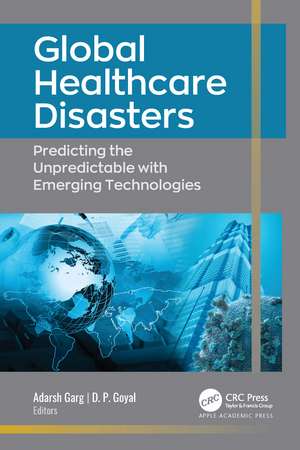Global Healthcare Disasters: Predicting the Unpredictable with Emerging Technologies
Editat de Adarsh Garg, D. P. Goyalen Limba Engleză Paperback – 26 aug 2024
This book discusses mathematical models using graph-based approaches for analyzing dynamic, heterogeneous, and unstructured data for applications in epidemiology. The authors also address the use of mobile applications for communication efforts and remote monitoring for gauging health and the effectiveness of preventive healthcare measures. The chapters discuss influencing factors that directly or indirectly target public health infrastructure that can lead to or exacerbate global health crises, such as extreme climate changes, refugee health crises, terrorism and cyberterrorism, and technology-related incidents. The book further looks at efficient methods to analyze disasters and how to deliver healthcare in areas of conflict and crisis.
This important volume, Global Healthcare Disasters: Predicting the Unpredictable with Emerging Technologies, provides a bounty of useful information for health professionals, academicians, researchers, governmental agencies, and policymakers across the world to predict, mitigate, and manage global health disaster with emerging technologies.
| Toate formatele și edițiile | Preț | Express |
|---|---|---|
| Paperback (1) | 574.26 lei 6-8 săpt. | |
| Apple Academic Press Inc. – 26 aug 2024 | 574.26 lei 6-8 săpt. | |
| Hardback (1) | 895.19 lei 6-8 săpt. | |
| Apple Academic Press Inc. – 4 aug 2022 | 895.19 lei 6-8 săpt. |
Preț: 574.26 lei
Preț vechi: 675.59 lei
-15% Nou
Puncte Express: 861
Preț estimativ în valută:
109.88€ • 119.74$ • 92.59£
109.88€ • 119.74$ • 92.59£
Carte tipărită la comandă
Livrare economică 23 aprilie-07 mai
Preluare comenzi: 021 569.72.76
Specificații
ISBN-13: 9781774910054
ISBN-10: 1774910055
Pagini: 222
Ilustrații: 90
Dimensiuni: 152 x 229 mm
Greutate: 0.3 kg
Ediția:1
Editura: Apple Academic Press Inc.
Colecția Apple Academic Press
ISBN-10: 1774910055
Pagini: 222
Ilustrații: 90
Dimensiuni: 152 x 229 mm
Greutate: 0.3 kg
Ediția:1
Editura: Apple Academic Press Inc.
Colecția Apple Academic Press
Public țintă
Academic and PostgraduateNotă biografică
Adarsh Garg, PhD, is currently Professor (IT and Analytics), GL Bajaj Institute of Management and Research, Greater Noida, India. She was formerly Professor at Galgotias University, Gautam Buddh Nagar, Greater Noida, India, and Visiting Professor at Delhi Technical University, Delhi, India. Prior to joining Galgotias University, she worked with organizations including WIPRO Tech, GE, IMT Ghaziabad, Punjabi University, and Patiala. She is currently supervising several PhD candidates. Dr. Garg has published over 50 research papers in refereed international/national journals and conference proceedings. She is a member of various professional bodies, including the Computer Society of India and the ACM-Computer Science Teachers’ Association. She has 20 years of teaching, corporate, and research within the areas of her interest, which include business analytics, data mining, business intelligence, MIS, e-learning, and project management experience.
D. P. Goyal, PhD, Director and Professor at the Indian Institute of Management, Shillong, India, and is also a visiting professor at Aarhus University, Denmark. Prior to joining IIM Shillong, he was Professor at MDI¸ Gurgaon, India. He has more than 32 years of corporate, teaching, and research experience to his credit. His teaching and research interest areas include IS value, IS strategy, MIS, e-government, and business process management. He has published over 100 research papers in refereed international/national journals and conference proceedings. He is a member of various professional bodies and is associated with many business schools and universities in the capacity of member of Board of Governors, Academic Council, Board of Studies, Academic Advisory Board, etc. He has been a consultant to the government of India for various assignments, and has authored almost 20 books, including textbooks on management information systems, IT project management, and enterprise resource planning.
D. P. Goyal, PhD, Director and Professor at the Indian Institute of Management, Shillong, India, and is also a visiting professor at Aarhus University, Denmark. Prior to joining IIM Shillong, he was Professor at MDI¸ Gurgaon, India. He has more than 32 years of corporate, teaching, and research experience to his credit. His teaching and research interest areas include IS value, IS strategy, MIS, e-government, and business process management. He has published over 100 research papers in refereed international/national journals and conference proceedings. He is a member of various professional bodies and is associated with many business schools and universities in the capacity of member of Board of Governors, Academic Council, Board of Studies, Academic Advisory Board, etc. He has been a consultant to the government of India for various assignments, and has authored almost 20 books, including textbooks on management information systems, IT project management, and enterprise resource planning.
Cuprins
1. Role of Knowledge Graphs in Analyzing Epidemics and Health Disasters 2. Forecasting of COVID-19 with the ARIMA Model in India as a Preventive Measure of Healthcare Catastrophe 3. Role of Artificial Intelligence in the Era of COVID-19 to Improve Hospital Management 4. Challenges of Global Healthcare Disasters 5. Healthcare Disaster Prediction with IoT, Data Analytics, and Machine Learning 6. Effectiveness of Aarogya Setu Mobile Application During COVID-19 Healthcare Management: A Technology Acceptance Model-Based Approach 7. CoReS-Respiratory Strength Predicting Framework Using Noninvasive Technology for Remote Monitoring During Heath Disasters 8. Exploring the Scope of Policy Issues Influencing IoT Health and Big Data: A Structured Review 9. COVID-19 Disaster Healthcare Management System in Rural Areas 10. Sentiment Analysis for Sustainable Healthcare During Pandemic Outbreak: Lessons Learned from COVID-19 11. Design Schema to Offer Security and Confidentiality to Healthcare Data in Cloud Environment
Descriere
Discusses state-of-the-art technology for predicting disasters by designing healthcare disaster management systems that use modern technology—cloud computing, artificial intelligence, IoT, data analytics, machine learning—to increase effectiveness in remote sensing technologies, data analytics, data storage, GIS, GPS, etc.
